 Info days are key opportunities to find out more on calls, ask questions and most importantly… to network! Take a look at some forthcoming ones and see if there are any you could make to help boost your list of potential collaborators.
Info days are key opportunities to find out more on calls, ask questions and most importantly… to network! Take a look at some forthcoming ones and see if there are any you could make to help boost your list of potential collaborators.
ICT FP7 Info Days: There are 2 info days coming up. The first is at the University of Wolverhampton on 13.06.12. This event is aimed at the research and business communities who are interested in submitting project proposals to FP7 ICT Call 2013. The aim is to provide information to UK organisations on the FP7 ICT theme calls, i.e. to help participants better understand the work programme and criteria for the evaluation of proposals, to facilitate sharing of ideas and experiences, and to meet potential partners for project consortia. You will need to register on the FP7 ICT Information Event booking site to attend. The second day is organised by the EC in collaboration with the Polish Ministry of Science and Higher Education and the Polish National Contact Point, is organising the ICT Proposers’ Day 2012, to be held in Warsaw on 26 and 27 September 2012. This two day event will provide networking opportunities for researchers interested in submitting proposals to the 2013 Work Programme calls. The event will also offer the chance to present your project ideas, provide first-hand information from European Commission officials, guidance on how to present a successful proposal and much more. The event will be free of charge, but attendees must register in advance. Online networking and registration will open at the end of June.
Health FP7 Info day: The National Physical Laboratory (NPL) will host the UK Open Info Day for the 2013 Health Call on the 16th of May. The event, organised jointly between the NPL, the Healthtech and Medicines KTN and FP7UK, is open to academic researchers, SMEs, Industry, NHS, charities and public bodies, and anyone interested in finding out about the opportunities in this year’s call.Places are free but on a first come first served basis so register quickly if you want to attend!
Environment FP7 Info Day: booking isn’t yet open but the info day is likely to be 11.06.12 and not 12.06.12 as originally planned.
Social Sciences and Humanities FP7 Infoday: This is a training and information day by the UK’s expert advisors (National Contact Points) on FP7- Social Sciences and Humanities, FP7 – Science in Society and HERA (Humanities in the European Research Area). Each session will include a presentation, case study and Q&A. If you wish to attend the event complete the form below before and return it to Depcoord@soton.ac.uk before 25th May 2012:
| Your Name |
|
| Email Address |
|
| University |
|
| Will you be staying for lunch? |
|
| Do you want to arrange a 1:1 with a speaker? If yes please advise details |
|
| Do you have any special dietary requirements? |
|
KBBE (Food, Agriculture, Fisheries & Biotechnology) FP7 Info Day: An open information day and brokerage event will take place on 16 July 2012 in Brussels, Belgium. The programme will consist of plenary sessions and several parallel workshops on participating in FP7 KBBE. Participants will also be able to exchange information and network at a special session where various service providers will be present. The conference will bring together research stakeholders, from both the public and private sectors from the EU and Third Countries, together with the Commission, to provide information and to find partners for projects to be funded under the upcoming FP7-KBBE-2013-7 call.
Space FP7 Info Day: COSMOS, the EU Space National Contact Point (NCP) network, will deliver the International Information event on the 2013 FP7 Space Call. This event will take place on 20 and 21 June at the University of Surrey.Participants will be provided with:
- first-hand information on the Call content and on future EU Space funding under Horizon 2020;
- pre-organised as well as spontaneous matchmaking opportunities via face-to-face meetings;
- short presentations on project ideas and the competencies of potential partners;
- profile poster session; and
- spontaneous networking opportunities in a relaxed environment.
It is expected that potential applicants from all over Europe will attend this event. People interested in attending this event are required to register and submit their ‘co-operation profile’ before 10 June.
European Maritime Day 2012: The 2012 edition will be held in Gothenburg, Västra Götaland, Sweden – for the first time in Scandinavia and in the North Sea area. The theme of this year’s conference is “Sustainable growth from the oceans, seas and the coasts: Blue growth”. The purpose is to highlight the importance of the seas and oceans and the challenges facing maritime regions and sectors.
TurKey Enabling Technologies 2012 International Brokerage Event (Istanbul, 25.05.12): This high-level event – which is organised under the scope of TUBITAK’s Turkey in FP7 project – will bring together 300 researchers and organisations involved in: Biotechnology; Advanced Materials; Advanced Manufacturing & Processing; and Space Technologies; with the desire and capability to help overcome a wide range of challenges.
Public Private Partnerships Info Day on 2013 Calls for Efficient Energy Buildings, Green Cars and Factories of the Future: The European Commission will be holding an information and brokerage event on the next (and final) calls under FP7. The event on these 2013 calls, which are funded through various themes within the FP7 Co-operation Programme, will take place on the 9-10 July 2012 in Brussels. The agenda includes roundtable discussions on future outlook of these three PPPs under the EU’s next research and innovation programme, Horizon 2020. You can register on the Event website.
 Horizon 2020 will replace FP7 and is currently under development. Several stakeholder groups have been meeting with EC officials to help influence and shape the Programme.
Horizon 2020 will replace FP7 and is currently under development. Several stakeholder groups have been meeting with EC officials to help influence and shape the Programme.
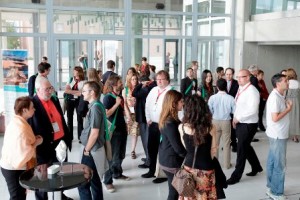

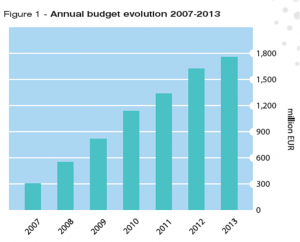
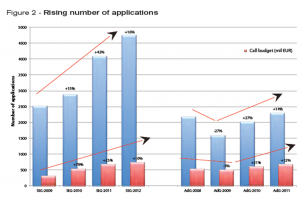
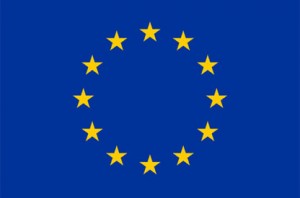
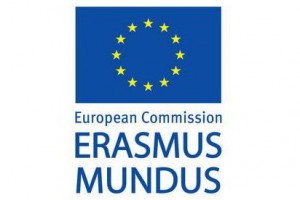
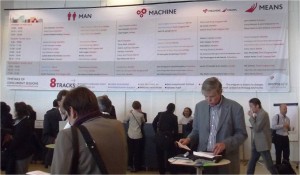
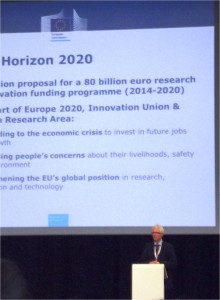







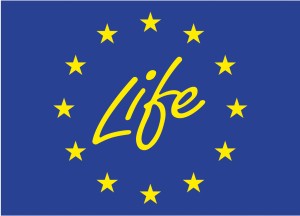












 Conversation article: London Marathon – how visually impaired people run
Conversation article: London Marathon – how visually impaired people run Horizon Europe News – December 2023
Horizon Europe News – December 2023